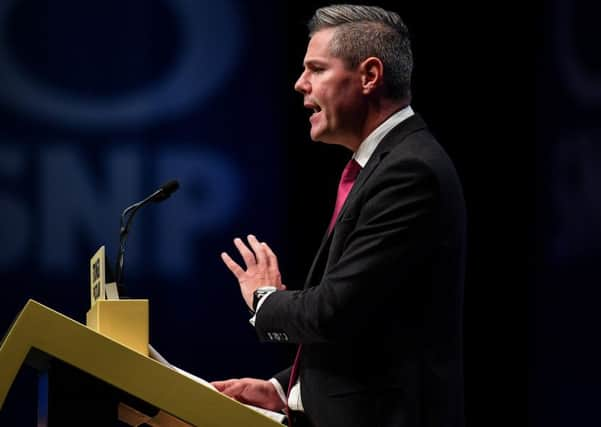Why Scottish Government may struggle to produce a coherent budget – Bill Jamieson


Scotland’s Finance Secretary Derek Mackay is furious that the UK Government’s 11 March budget date has left him snookered. It is the second time the SNP administration has had to contend with a Scottish budget delay, leaving it little time to draw up its own tax and spending plans ahead of the new tax year.
Adding to his misery is a call from Prime Minister Boris Johnson to his Cabinet colleagues to seek out savings in their departments. “Sacred cows must go”! Spare us “Barnet consequentials” north of the border.
Advertisement
Hide AdAdvertisement
Hide AdBut there is consolation of sorts for Mr Mackay were he to read that famous “bring me weirdos and misfits” blog of that Downing Street Rasputin, Dominic Cummings.
On that same blog, he wrote that “there is a huge amount of low hanging fruit — trillion-dollar bills lying on the street” by way of Whitehall savings. A similar exercise in government offices in Edinburgh could doubtless yield extra money – though “trillion-dollar bills lying on the street” may be pushing it.
Chancellor Sajid Javid’s latest Budget Day plans have indeed presented Mr Mackay with formidable problems. He has attacked the plans as “disrespectful to devolution” saying they could have “profound consequences” for Scotland. Scottish councils need to set their budgets by 11 March, and local government umbrella body Cosla has written to Mr Javid warning of “catastrophic risks” to local services.
It is not just that the tax and spending plans, both of the Holyrood administration and Scottish local government have been set a near-impossible timetable. This long-delayed UK budget with its infrastructure ambitions promises to be one of the most extensive and far-reaching for decades.
Thrown into turmoil
Alexander Garden, chair of the Chartered Institute of Taxation’s Scottish technical committee, warns that if MSPs fail to reach an agreement – “a scenario that could be seen as highly plausible in a parliament of minorities – Scotland would revert to the UK rates and bands of tax set by Westminster, effectively foregoing its ability to set its own income tax rates”.
As for the work of the Scottish Fiscal Commission (SFC), tasked with setting out tax and spending forecasts for years ahead, together with estimates of economic growth, this, too, has been thrown into turmoil.
All this may seem abstract and remote from the everyday concerns of Scottish households, but it will have a direct effect on our livelihoods and wellbeing. The SFC had hoped to publish its forecasts on 12 December – a date blown to smithereens by the general election.
The Prime Minister’s exhortations for Whitehall spending departments to find major savings may be dwarfed by the Government’s plans to fund thousands of more nurses, 20,000 more police, millions more to be invested in schools, science, apprenticeships and infrastructure – and a massive programme of road improvements.
Advertisement
Hide AdAdvertisement
Hide AdBut if Mr Javid is to meet his commitment to ensuring “public sector net investment will not average more than three per cent of GDP” and that “debt will be lower at the end of the Parliament”, this means a squeeze on current spending.
Wellbeing targets
All this is to be achieved without recourse to higher income tax and VAT, and against a backcloth of lacklustre economic growth. The SFC’s current forecast is of growth in 2019 of 0.8 per cent, rising only fractionally to 0.9 per cent this year.
So, what can we expect? The Chancellor is due to announce a change in Treasury rules: currently, investment decisions are based on the generation of gross value added, an output measure that has benefitted London and the south-east. The new rules are expected to include targets for improving wellbeing or reducing regional productivity gaps. These are likely to have consequentials for Scotland.
The Conservatives have also pledged to raise capital spending by some £20 billion. Funds could be diverted from the planned High-Speed Rail route between London and Birmingham to smaller cross-country rail link improvements. The manifesto also included plans for an additional £1.5 billion spending on public services. Another area of spending uplift could come in energy efficiency, with £9.2 billion for spending on insulation and similar measures for schools and hospitals.
Little by way of tax cuts are expected other than raising the threshold for national insurance contributions to £9,500 a year in 2020-21 as well as reducing the burden of business rates on companies. Here the SNP administration is already under pressure from business lobbies to scrap Scottish Green Party proposals to devolve rate-setting powers to local authorities – seen as a green light for runaway town hall spending.
“Trillion-dollar bills lying on the street”? Barring an influx of Dominic Cummings’ “misfits and weirdos”, Scotland’s Finance Secretary will struggle to present a coherent Scottish Budget this year – whenever his budget comes.
